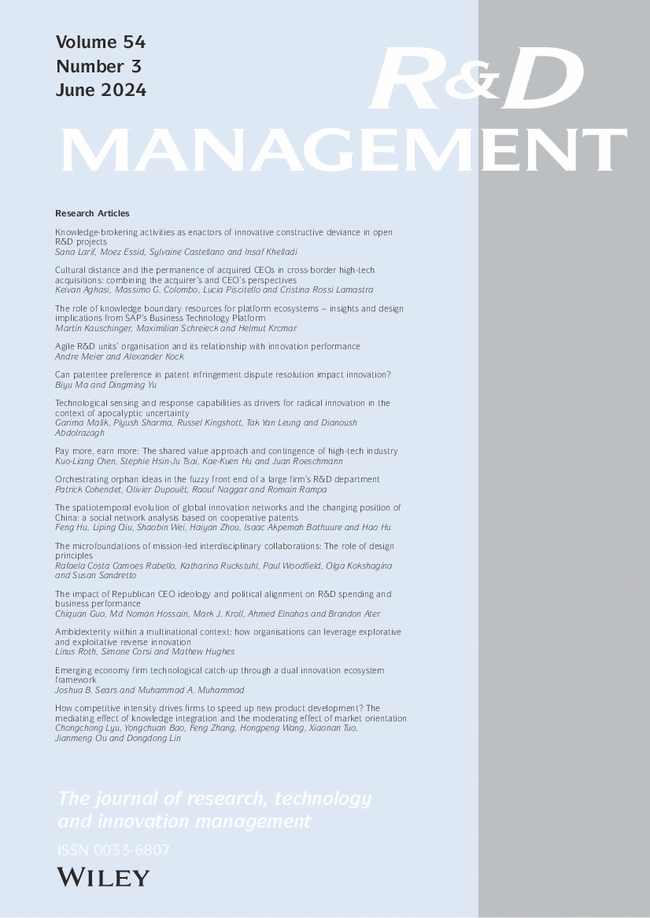Open social innovation in response to grand challenges: promotor influence as change agent
IF 5.7
2区 管理学
Q1 BUSINESS
引用次数: 0
Abstract
Following on from the R&D Management COVID‐19 two‐part special issue editorial, this paper strives to deepen our knowledge of Open Social Innovation (OSI) in such grand challenge contexts through exploring the promotor role(s) and interventions in managing temporary organisations. Through an exploration of three case studies that emerged from a bottom‐up perspective, in response to the COVID‐19 grand challenge, this study highlights the central role played by promotors in leveraging OSI projects. The core elements of the George et al. (2016) grand challenge framework are explored within the cases, through a promotor theory lens, to understand how the promotor roles (power, process, technology and relationship) influence the emergence of the temporary OSI organisation to enable a societal contribution. The research recognises the potential of OSI as a response to future grand challenges, highlighting the importance of management routines, such as communicating and articulating the need, adoption of project management practices, leveraging network ties through promotors' credibility and co‐ordinating partners (& volunteers) for nurturing objective achievement. The research also highlights impediments that can curtail progress, which potentially impacts the longevity and outcomes of OSI. This study demonstrates the important role of promotors in initiating OSI communities to respond to grand challenges and given the complexity and enormity of the task, promotors must establish routines to engage and co‐ordinate a collective ecosystem, since they cannot execute alone. Thus, OSI communities require assistance from government and/or commercial entities to exploit and effectively co‐ordinate such OSI endeavours to ensure a meaningful contribution.应对重大挑战的开放式社会创新:作为变革推动者的推动者的影响力
继《研究与开发管理》(R&D Management)COVID-19 两部分特刊社论之后,本文通过探讨发起人在管理临时组织中的作用和干预措施,努力加深我们对此类重大挑战背景下的开放式社会创新(OSI)的认识。本研究从自下而上的角度探讨了应对 COVID-19 大挑战的三个案例研究,突出强调了推动者在利用开放社会创新项目中所发挥的核心作用。乔治等人(2016)大挑战框架的核心要素在案例中通过推动者理论的视角进行了探讨,以了解推动者的角色(权力、流程、技术和关系)如何影响临时性开放源码软件组织的出现,从而为社会做出贡献。研究认识到了开放社会倡议作为应对未来重大挑战的潜力,强调了管理常规的重要性,如沟通和阐明需求、采用项目管理实践、通过推动者的信誉利用网络关系以及协调合作伙伴(&;志愿者)以促进目标的实现。研究还强调了可能阻碍进展的因素,这些因素可能会影响开放社会倡议的持久性和成果。本研究表明,发起人在启动开放社会倡议社区以应对重大挑战方面发挥着重要作用,鉴于任务的复杂性和艰巨性,发起人必须建立常规程序,以参与和协调集体生态系统,因为他们无法单独执行任务。因此,开放系统互连社区需要政府和/或商业实体的协助,以利用和有效协调这种开放系统互连努力,确保做出有意义的贡献。
本文章由计算机程序翻译,如有差异,请以英文原文为准。
求助全文
约1分钟内获得全文
求助全文
来源期刊

R&D Management
Multiple-
CiteScore
11.30
自引率
9.50%
发文量
0
期刊介绍:
R&D Management journal publishes articles which address the interests of both practising managers and academic researchers in research and development and innovation management. Covering the full range of topics in research, development, design and innovation, and related strategic and human resource issues - from exploratory science to commercial exploitation - articles also examine social, economic and environmental implications.
 求助内容:
求助内容: 应助结果提醒方式:
应助结果提醒方式:


